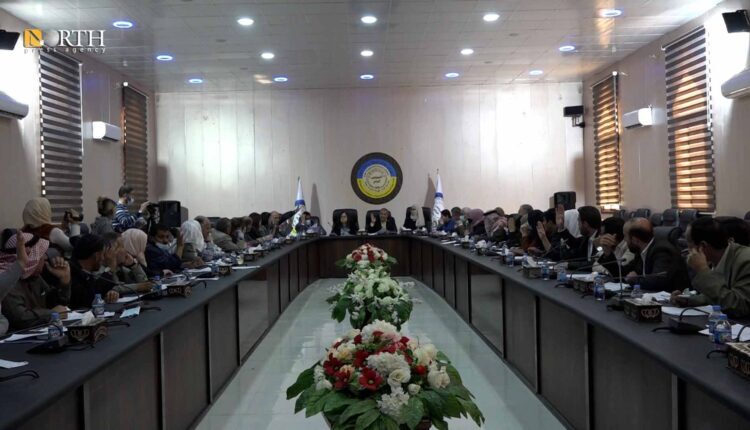
By Dilsoz Youssef
QAMISHLI, Syria (North Press) – The Autonomous Administration of North and East Syria (AANES) has recognized Kurdish, Arabic, and Syriac as official languages since its formation. However, while these languages are used in its social contract, all official and archival documents are written in a single language. As a result, many people are demanding amendments to protect the rights of all communities.
The language issue is considered one of the most important demands raised by protesters from the various communities of the Syrian people at the beginning of the Syrian war, over a decade ago. Many schools and institutes have been opened in the AANES-held areas that teach the languages of the region’s inhabitants.
The Social Contract, as defined by the AANES, refers to a set of theoretical and practical principles, laws, and regulatory rules that are established to define the relationship between the governing authority and the people. It outlines the rights and responsibilities of individuals and officials within the society.
Despite these efforts, a true linguistic representation within its official documents has not been realized. This raises the question of how the AANES will embrace linguistic diversity in the new Social Contract.
Linguistic diversity
In the middle of 2021, the AANES announced its intention to revise the existing Social Contract as a proactive measure in preparation for local elections in the areas it governs.
However, this contract has not been brought forth since the last discussion session of the contract drafting committee over a year ago.
Abdullah Sheikho, the director of Naqsh Publishing House in the city of Qamishli, northeast Syria, asserts that although linguistic pluralism is recognized in principle in the social contract, it lacks genuine implementation. However; this contract has not been brought to fruition since the last discussion session of the contract drafting committee over a year ago.
He further said in a statement to North Press “Arabic still remains the main language and often the only language used in official transactions and discussions within the AANES’ institutions, as these institutions disregard the provision related to linguistic pluralism.”
He emphasizes that achieving linguistic pluralism requires extensive work, including the need for legislation, subsidiary laws, adequate budgets, and broad strategies to support it.
According to Sheikho both the Kurdish and Syriac languages have been subjected to marginalization since the inception of the Syrian state, under the successive governments that have governed Syria.
He emphasized the need to establish serious linguistic institutions with high capacities and to develop and strengthen existing institutions.
“There is a dedicated institution for the development of the Kurdish language, which is the Kurdish Language Institute; however, there is no specific law governing the work of this institution, unlike the Arab Language Academy, which is managed by the Syrian government under a specific law that allows it to benefit from state resources,” he further added.
According to observers, the failure to adequately translate documents into the languages used in the AANES can be attributed, in part, to the insufficient language skills of officials who hold key positions, even though there are linguistic institutions for these languages established in all regions, which have made notable progress in the field of education.
The Education Board, affiliated with the AANES, aims, during the new Social Contract, to issue documents and archive them in at least two languages, according to Samira Haj Ali, co-chair of the Education Board in north and east Syria.
She stated that the Social Contract preserves all languages within the geographical scope of northeastern Syria in all aspects of life, especially education and culture. “Any community has the right to develop its cultural and linguistic aspects.”
“As for other matters, it is our responsibility as education board. Some time ago, the Kurdish Language Institute organized a workshop aimed at writing official documents in the Kurdish language alongside Arabic. The Syriac community, who has its own language institute, can also conduct similar workshops, given that all documents and archives are in Arabic,” Haj Ali stated.
She clarified that the workshop’s outcomes emphasized the need for documents to be archived and issued in at least two languages, with one of them being Kurdish.
Haj Ali pointed out that these decisions have not been fully implemented yet, as the Social Contract has not been officially issued. However, preparations are being made to pave the way for these decisions.
She further explained that “Language education offices will be established in recently liberated areas, allowing individuals to learn the language of other communities. Currently, these offices are present in all the AANES areas except for Tabqa, Raqqa, and Deir ez-Zor. The offices are currently being prepared, and in the near future, courses will be launched primarily targeting the employees of the AANES.”
The AANES was first formed in 2014 in the Kurdish-majority regions of Afrin and Kobani in northern Syria following the withdrawal of the government forces. Later, it was expanded to Manbij, Tabqa, Raqqa, Hasakah and Deir ez-Zor after the Syrian Democratic Forces (SDF) defeated ISIS militarily there.
